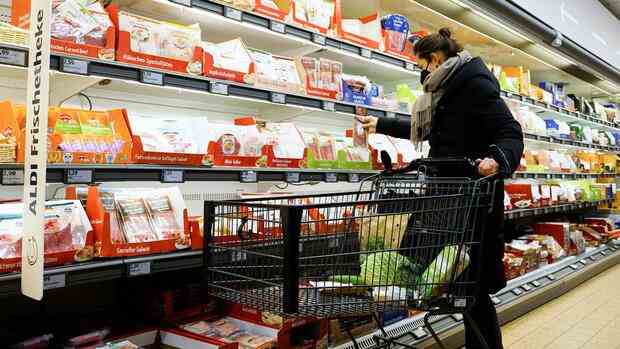By 2030, the discounter wants to have converted all meat products to the higher husbandry forms three and four.
Dusseldorf With great pathos, the discounters Aldi Nord and Aldi Süd announce their latest advance in animal welfare. “For us, it is a matter close to our hearts to promote the change in attitudes,” says Katrin Beyer, who is responsible for the topic at Aldi Nord. According to the dealers, this is no less than a “game changer”.
What are the discount market leaders up to? By the year 2030, they also want to convert their entire range of chilled meat and sausage products to the higher forms of husbandry three and four, i.e. to animal husbandry that at least provides open stables and is thus well above the minimum legal requirements. Products such as salami, boiled ham, bacon and sausages would be affected.
“We will no longer deviate from our timeline, which stands, and we will stick to it,” says Julia Adou, who is responsible for sustainability at Aldi Süd. But it is still unclear whether this will actually succeed.
In July 2021, the two discount sisters had already announced that they would convert their range of fresh meat to types three and four by 2030. With housing type three, the animals have more space and get fresh air through an open wall. In the case of husbandry type four, outdoor exercise is also included.
However, almost half of the meat consumption in Germany is not fresh meat, but processed meat and sausage products. That’s why Aldi Süd and Nord have now also developed a phased plan for switching this range.
Lidl and Rewe also want to switch to higher forms of husbandry
By 2025, they want to completely do without goods from husbandry form one. The step is not that big: Today, 90 percent of the sausages at Aldi come from husbandry type two or higher. By 2026, a third should come from the two highest forms of husbandry and the switch should be completed by 2030.
>> Read also: Farmers’ association is pushing for funding to convert animal husbandry
With its announcements, Aldi has placed itself at the forefront of the retail industry. All other major retailers are also pushing ahead with the changeover, but very few of them are doing so consistently. Rewe also wants to completely phase out the two lower forms of keeping fresh meat by 2030. After all, Lidl has announced that by 2026 a third of the fresh meat range will be converted to types three and four.
But experts and farmer representatives were already skeptical about Aldi’s plan for fresh meat. In order to provide sufficient meat of this quality, agriculture would have to be massively restructured.
Construction and environmental law stand in the way of this, criticized Hubertus Beringmeier, President of the Westphalian-Lippe Agricultural Association, for example. For reasons of climate protection, for example, stables with an outdoor area are only reluctantly approved – because of the emissions caused by animal husbandry.
In addition, the conversion costs the farmers a lot of money. And they are not sure whether it will pay off for them, i.e. if they will get correspondingly higher prices.
Aldi cannot and does not want to guarantee that either. “It is very difficult to predict how the price will develop,” says Aldi Nord manager Beyer. By including the sausage, however, the company can optimally distribute the surcharges across many items.
Aldi promises low prices even with more animal welfare
But one thing is already clear: there will probably not be a high surcharge for better animal husbandry. “We promise the customer a good price-performance ratio for the higher forms of husbandry three and four,” says Beyer.
>> Read also: When customers buy no-name products – and where they still use brands
The discounters explain that they see a high level of willingness on the part of customers to resort to higher forms of husbandry. In practice, however, this is currently less likely to be observed in view of the sharp price increases in the food trade. Animal welfare meat is no longer selling as it used to be because of inflation, Farm President Joachim Ruckwied said at the Green Week in January.
The farmers are thus in a dilemma. Aldi emphasizes that its plan to change attitudes gives the farmers planning security. But the farmers have to rebuild at their own expense and risk.
Federal Minister of Agriculture Cem Özdemir wants to provide at least one billion euros for the conversion, but has already indicated that this will probably not be enough by far. “The one billion euros that politicians have promised so far is not enough,” explains Aldi manager Adou.
“Improving animal husbandry is a task for society as a whole,” says Adou. Everyone has to be involved, from consumers to agriculture and trade to politics. Aldi does not offer farmers financial commitments or fixed purchase prices either.
More: Aldi promises more animal welfare – but climate protection laws are slowing down the plans.
